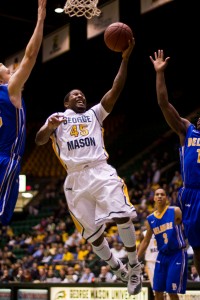Back in Business
February 19, 2012 · 0 Comments
by John Powell
In the final year of a basketball player’s collegiate career, the culmination of his work serves as a drive to finish strong. It’s usually a victory lap, collecting awards, getting recognition at senior day and, of course, leading the team late into March.
But for Andre Cornelius, offseason problems stunted that senior growth. He had some legal problems and, compounded with a new coach and a new offensive scheme, it was an offseason of adjustment.
“It was a big surprise that Coach [Jim Larranaga] left,” Cornelius said. “But we had to adjust to our new coach and get ready. We couldn’t dwell on the past because he was already gone. We had to move forward and get used to this coach.”
He rejoined the team 10 games into the year, trying to solidify his place on a team where Paul Hewitt was content with the play of point guards Bryon Allen and Corey Edwards at the top of the key. Fans were content with winning.
The veteran guard relied on what he knew best. He worked hard despite the inability to practice with the team and relied on his defense when he came back, understanding that his shot-making may take a few games to come back.
“He started out unbelievable. He played with a lot of energy. He was great defensively,” Hewitt said. “So getting back into the pace of play was not the issue. The issue was just some of the sharpness you miss when you’re not with your teammates.”
Senior forward Mike Morrison, who has played alongside Cornelius for four years, remembers their freshman campaign.
“He was a ball of energy. A playmaker. From the first time he got here to now, he’s a playmaker,” Morrison said. “A lot of playmakers come in and take starters’ spots. It just made us play hard. Playing a lot of minutes freshman year. He played well, very well.”
Cornelius took the starting role his sophomore year, along with Morrison and the team’s do-it-all man Ryan Pearson, and took the team back to the NCAA Tournament by his junior season. His shooting numbers were not as consistent, but his well-timed 3-point shots gave the team energy.
“He made a lot of big plays all the time but, as he developed, he got smarter and his leadership started coming through, especially on the court,” Morrison said. “There are a lot of young guards. He’s teaching them, pressuring them [and] getting on them a little bit.”
Even when the offense was not his strength, he relied on his defense.
“[Larranaga] said ‘If you come here, you have to play defense,’ so that’s what I came to do,” Cornelius said. “I got my playing time off of my defense and my ability to score.”
After all the success the team enjoyed, it made it that much harder to sit out and that desire to come back was obvious.
“It was very difficult, I’m sure, because he definitely wanted to play,” Morrison said. “Games, just sitting there watching, he felt like he was hurting his team. Not happy, but he handled it very well.”
With a new coach, the delay in coming back still has an effect on his game. When there’s a new system, new players vying for a starting job and old traditions of success to uphold, 10 games is the longest month a basketball player can experience. He still needs to improve with the system because he is a bit behind the learning curve.
“I guess he’s got to be a little more patient. There are some times where he tries to make shots out of nothing,” Hewitt said. “I mean things like screens, or using your ability to pressure the ball to force shots and create transition opportunities. The bigger picture, as opposed to just, ‘give me the ball, let me score.’”
At time this season, Cornelius has been the spark the team needed. As he continues to improve, his leadership on the perimeter could push the Patriots through Richmond and into the Big Dance.


